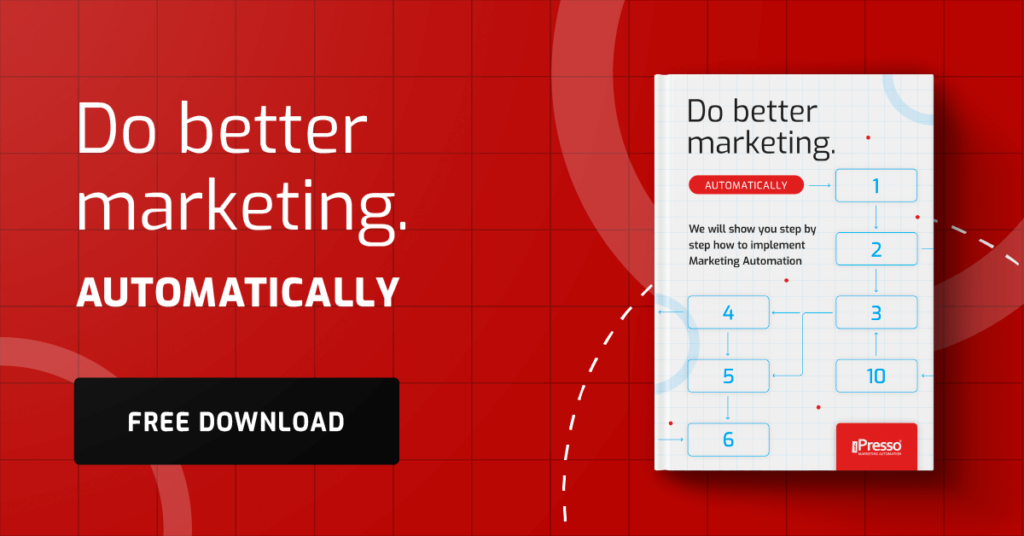Marketing automation and sales: a matched pair.

Combining sales with marketing automation means combining these methods into effective tactics for acquiring, engaging and converting customers. It’s a combination that enables marketing and sales teams to increase efficiency and better engage with customers in various global markets.
Marketing automation is a tool that supports companies in planning and implementing marketing campaigns. It covers activities at every stage of the customer’s purchasing journey: from the first contact with the brand to communication that takes place after the transaction is completed.
How can sales work with marketing automation?
Gaining more value with less is the main motto of every marketing automation tool, ensuring companies can scale their operations and save costs. Thanks to automation, it is possible to reduce expenses related to manual processes, which frees up human resources for more strategic tasks where their experience can be best used.
And what is most important: marketing automation gives the company the ability to collect and organize customer data in a valuable way.
The most popular combination of sales with marketing automation systems is the automation of attracting potential customers and providing them with personalized content tailored to various stages of their purchasing journey.
This is an effective combination that uses content tailored to customer needs, based on information collected by marketing automation tools. These tools store customer data and use it to predict their future behavior, enabling you to deliver the right content at the right time and context.
How will marketing automation impact sales?
Marketing automation brings many benefits to sales teams. From better generation and nurturing of potential customers to increased work efficiency and comprehensive collection of various data that support making more informed decisions. This comprehensive approach contributes to streamlining processes and increasing the effectiveness of operations.
Marketing automation allows a company to reach potential customers by sending personalized messages (such as e-mails, text messages, or WhatsApp messages) at the right moment, for example when a specific group of customers is most active online. This allows you to better tailor your communications to your audience’s preferences and behaviors, which can increase effectiveness and engagement.
Marketing automation allows sales departments to segment customers into different categories, such as demographics and specific interests. This, in turn, facilitates the delivery of tailored offers and information to specific customer groups, which increases the chances of effective communication and interest of potential customers in the company’s offer.
Let’s look at it with an example: here’s what lead care can look like throughout the entire stage of the purchasing journey. First, you send such a (potential) customer a welcome e-mail (for example, thanking him for subscribing to the newsletter), then you inform him about new products, subtly incorporating information about current promotions into such messages.
This helps build relationships with potential customers and also keeps them connected to your brand. It makes them remember you. However, when the customer finalizes the sale and moves on to the last stages of the purchase path, you can use marketing automation to send requests for product reviews or promoting related products (cross-selling).
Additionally, marketing automation tools provide comprehensive reporting options marketing campaigns carried out. By collecting this data, you can, on the one hand, check how effective your campaigns were and, on the other hand, quickly calculate the real return on investment (ROI). By using this quickly accessible knowledge, you will be able to optimize your marketing activities in the future.
How to automate sales and marketing?
The key is to think about the use of tools in harmonious combination with each other. If you’re using a CRM system for sales automation, you might want to consider integrating with an email marketing platform to automatically send follow-up emails or a live chat app to automatically respond to customer inquiries. Using integration between different tools can significantly increase operational efficiency and improve customer service.
It is crucial to closely monitor results and measure success. It is important that marketing and sales automation brings a return on investment. Relying on data, not just guesswork, allows you to better tailor your strategy to the actual needs and preferences of customers. This enables more effective actions and decision-making based on specific information, which in turn can lead to greater success and achieving intended goals.
Integrating all customer touchpoints allows you to track prospects at every stage of their journey until they become customers. Increasing automation and personalization allows you to speed up the transaction process and retain customers for longer. This approach enables you to better understand customer needs and deliver more effective and personalized experiences, which can help increase loyalty and repeat business.
Taking care of the customer experience is a key element. Providing them with relevant information in the most efficient way and sending them personalized offers makes it easier for customers to find what they need. A constant stream of relevant offers can increase their commitment and willingness to use the services or products that best meet their expectations. This approach can result in increased customer satisfaction and brand loyalty.



